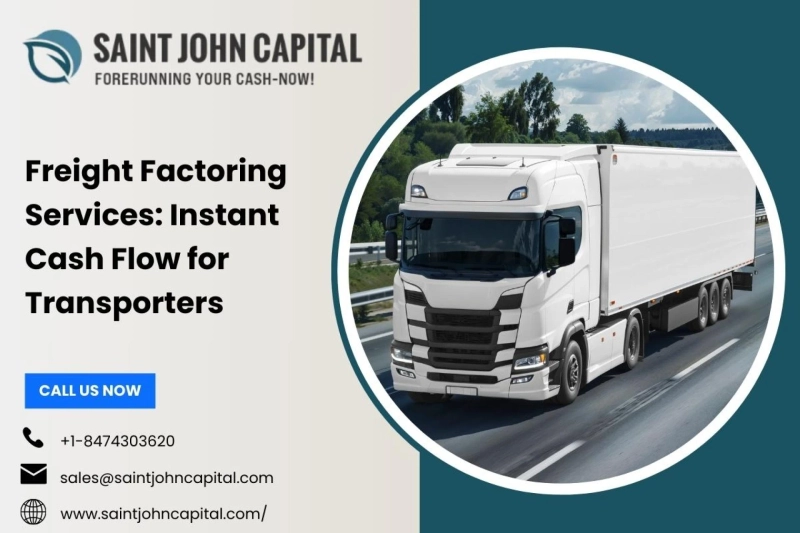The transport industry often faces payment delays from freight brokers or shippers and thus, can always benefit from instant cash flow instead of simply waiting for payments to clear, which may take anywhere up to ninety days. This creates a ripple effect when all payments, from truck drivers to maintenance and repair services, all are subject to unforeseen delays.
This is where freight factoring steps in: it reduces the financial burden faced by trucking companies as these factoring companies provide instant cash to transport companies, in return for their unpaid invoices.
This article will guide you through what factoring means for transport companies, how it helps small fleets and lastly, what to look for in a freight factoring service, so your trucking company can manage cash flow and liquidity despite delays in invoice payments.
Freight Factoring for Transport Companies: Meaning + Process
In simple terms, freight factoring refers to the process where transport companies opt for instant cash flow instead of waiting for unpaid invoices to be cleared. In this case, trucking companies give their unpaid invoices to a factoring company to receive partial payment from the factoring company instantly, while the remainder gets credited after the receiver plays the invoice. The factoring company only deducts a minor percentage from the invoice as fees, so there are no unnecessary delays or deductions.
The overall process of factoring for transport companies is discussed below.
Freight Factoring: Step-by-Step Process
The transport company receives the complete invoice amount within ninety days, however, they receive a major amount of funds from the factoring company within just 24-48 hours. The complete freight factoring process involves four main steps from delivery of goods to receiving the full amount, which are as follows:
Step 1: Deliver the Load/Goods
In this step the transport company delivers the consignment to the customer and receives a signed bill of lading (BOL). This acts as a proof of the delivery when the delivery payment hasn’t been initiated or processed yet.
Step 2: Invoice Submission to Factoring Company
After receiving the BOL, the transport company submits the invoice to the freight factoring company instead of the customer. It is up to the carrier to factor all invoices or just some certain ones.
Step 3: Immediate cash Advance from Factoring Company
The factoring company evaluates the invoice and BOL while checking the transport company’s financial background and reliability. Then, they calculate the percentage of the invoice to be paid to the company in return of the unpaid invoice(s). The trucking company receives 90-98%of the invoice in just 24 to 48 hours.
Step 4: Final Fund Settlement
After the invoice is settled by the receiver of goods, the factoring company receives the complete payment. The factoring company charges just about 1-5% of the total invoice amount and sends the rest back to the transporting company.
Benefits of Freight Factoring for Small Fleets
Small fleets and large companies alike, benefit heavily from freight factoring in terms of liquidity management, immediate cash flow, and many other benefits listed below:
- Immediate availability of funds
- Fuel advances and discounts
- Freedom from long-term contracts
- Finding more trucking loads
- No chasing down payments
- Reduced paperwork load, and many more.
What to Look For in a Freight Factoring Service?
With the right factoring company, your payments begin pouring in effortlessly and in a timely manner, yet, how to know which factoring company to work with? For, this you need to understand your requirements such as the frequency of your payments and more, to evaluate them against the criteria mentioned below:
1. Contract Terms: Check if your requirements match your factoring company’s contract duration, minimum load value, contract termination fees, and if they are flexible with these metrics.
2. Pricing Structure: Check for additional costs or platform fees levied to understand what percentage of the invoice you will be paying to the factoring company.
3. Factoring Rates and Fees: It is important to check the amount of factoring rate and fee to understand the rates you’re offered, whether they are flat or variable. This fee mostly ranges between 1-5% of the invoice.
4. Funding Options: Most factoring companies provide 24/7 processing with instant or same-day crediting facilities to support your day-to-day business expenses.
5. Customer Support: Ensure your factoring company offers round-the-clock support or not, and also check for client testimonials.
6. Recourse and Non-Recourse Factoring: Assess how your factoring company addresses the situation if a receiver fails to make the payment. Recourse factoring requires you to make the full payment, whereas non-recourse options cost a bit more in general.
Freight Factoring: Instant Cash Flow for Transporters
It is clear now what freight factoring means from the process to considerations while choosing a factoring partner. Constant cash flow is not just a luxury but an operational requirement for running a transport business successfully, as delays in payroll or fuel payments impact a trucking company’s functionality and credibility. Therefore, freight factoring for small fleets is coming out to be a major boost when it comes to managing transport without having to chase down payments or drowning in paperwork.



